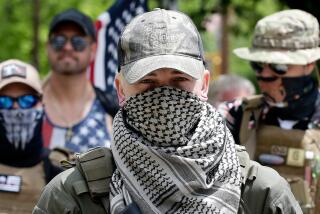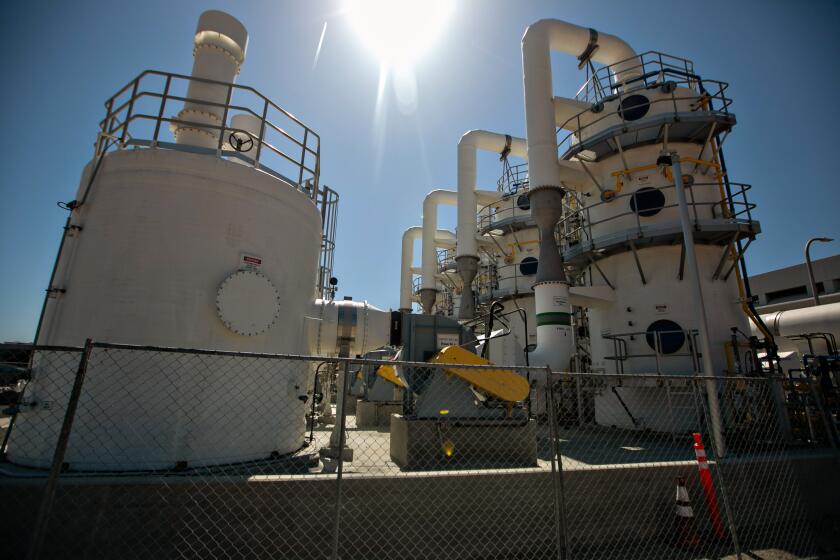Tanks, Troops Besiege Bethlehem
The streets of this biblical town belonged to the gunmen Friday. Residents cowered in their homes as firefights raged after Israeli troops and tanks moved in here and in neighboring Palestinian-controlled towns, ratcheting up pressure on the Palestinian Authority to hand over the killers of an Israeli Cabinet minister.
In clashes between troops and gunmen in several West Bank and Gaza Strip towns, six Palestinians were killed and more than 16 injured Friday. Three Israeli soldiers were injured, at least one of them seriously.
And before dawn today, troops and armored vehicles thrust into the northern West Bank towns of Kalkilya and Tulkarm, near the pre-1967 border with Israel. Palestinians reported that two of their police officers were killed in Tulkarm in gun battles with troops. Another man, described by Palestinians as an activist with the Islamic militant group Hamas, was killed in front of his house in Kalkilya.
In what appeared to be an effort to forestall Israel’s threatened military onslaught, the Palestinian Cabinet issued a statement Friday night saying that all Palestinian organizations must observe a cease-fire that the two sides agreed to in September. Any group that doesn’t will be regarded as “operating outside Palestinian law,” the statement said.
But the statement appeared to fall short of Israel’s demand that Palestinian Authority President Yasser Arafat ban all militias.
The Palestinian Authority continued to arrest members of the militant Popular Front for the Liberation of Palestine, the faction that claimed responsibility for gunning down hard-line Tourism Minister Rehavam Zeevi in an East Jerusalem hotel Wednesday. Palestinian officials, however, insisted that Arafat will not extradite anyone to Israel.
The mood in Bethlehem and Beit Jala, where shops were shuttered, schools closed and streets abandoned, was angry and defiant.
At the Beit Jala Government Hospital, more than seven wounded people had been treated by midafternoon. Nabil Odeh, 37, stood at the bedside of his 24-year-old brother, Hamzeh, whose right hand was torn off by shrapnel when he got too close to a predawn firefight in Bethlehem on Friday.
“Isn’t this a war already?” Nabil Odeh said. “If Arafat hands over these people the Israelis want, they will just keep asking for more.”
As he spoke, the crack of gunfire could be heard clearly outside, close enough to make patients and nurses flinch.
Earlier in the day, thousands of Palestinian men, many of them armed, surged through downtown Bethlehem in a funeral march for Atef Abeiyat, a militia commander from Arafat’s Fatah movement, and two other militia members. The three died when the car they were traveling in exploded outside Bethlehem on Thursday. The Israeli army did not claim responsibility for the killing but said that Abeiyat was wanted for allegedly carrying out a string of deadly attacks on Israelis.
Mourners chanted nationalist slogans and called for revenge as some militants fired into the air. After the burial, gunmen took up positions and began battling Israeli troops who had occupied two hotels, the Paradise and the Jacir Palace Intercontinental, on Bethlehem’s main road.
Before fighting erupted in September 2000, the Jacir Palace served as an elegant setting for Israelis and Palestinians to come together. On Friday, Israeli troops deployed in its deeply carpeted rooms that paying guests abandoned long ago, and took up sniper positions on its roof.
Abeiyat’s assassination made it harder for Arafat to crack down on the PFLP, said one of the group’s local leaders. Despite the Palestinian Cabinet’s statement, “we don’t have any official decision that the military wing is outlawed,” said Khader abu Abbara, a member of the PFLP’s central committee. “What does Arafat say to his people now? If he turns PFLP leaders over to Israel, he cannot defend his actions.”
The violence escalated sharply after Israeli tanks began deploying inside Palestinian territory before dawn Thursday. After Abeiyat’s assassination, Palestinians fired guns, then lobbed mortar shells at Gilo, a Jewish neighborhood built on disputed territory that Israel regards as part of southern Jerusalem.
In response, the tanks and troops moved deeper into Palestinian towns. By nightfall Friday, more than 30 tanks were in Bethlehem, Beit Jala and surrounding areas, and more stood ready at Israeli checkpoints outside Bethlehem.
More to Read
Start your day right
Sign up for Essential California for news, features and recommendations from the L.A. Times and beyond in your inbox six days a week.
You may occasionally receive promotional content from the Los Angeles Times.





